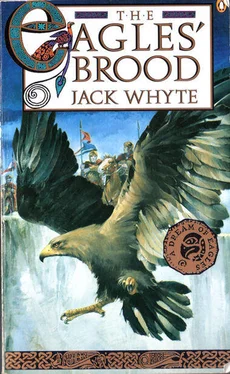By the time word arrived of my father's departure, however, my grandfather was dead, murdered by a madman, and my great-uncle Publius Varrus had assumed command of our Colony. Uncle Varrus knew what Caius Britannicus would have wanted him to do, and so he used my grandfather's seal and sent out soldiers to accept the consignment of horseflesh. This immediate quintupling of the Colony's herds had a revolutionary and permanent effect on the Colony. Victorex, the stablemaster, had to increase his staff of grooms and stablemen tenfold, and farms that had been under the plough had to be given over completely and immediately to the keeping of livestock. But the concerns voiced over the loss of arable land in this exercise were quickly stifled by the realization that this great influx of mounts gave us the capability to reclaim previously abandoned lands, and even to break new ground, since our corps of mounted troopers quickly became large enough to permit constant patrols in strength, and continuous protection for all the workers employed on these lands.
The biggest impact of all, however, was upon our foot- soldiers. Now that we had the livestock, every man who wanted to ride was able to do so, at least for part of their duty. Very soon infantry patrols of our territories were a thing of the past. Our central core of infantry was reduced from fifteen hundred to eight hundred men, who were distributed as semi-permanent garrison troops to three of our major outlying villa farms, and to the fort of Camulod itself.
As I have said, mine was a happy childhood and I grew in sunshine, shaped into the man I was to be by two stern and loving guardians: my two great-uncles, Ullic, King of the Pendragon, and Publius Varrus, Master of Camulod. My youth was divided equally between the rugged, lovely hills and mountains of the Pendragon strongholds to the northwest, in south Cambria, and the calm beauty of the wooded plains and forests that, seen from the hilltop, spread like a carpet around Camulod.
Ullic's Celtic hill people taught me to hunt with a sling and to trap with snares. They taught me to shoot with a bow and to fish for trout in the brooks with my bare hands. They taught me to sing and to pluck the harp and to love the history in their glorious songs, so that even before my voice broke from boyhood I was revered as a bard of great promise and had I not been who I was, the Druids would have claimed me as their own. As it was, I spent much time among Druid teachers, learning their sacred mysteries and the lore of their ancient ways, for they respected who I was and dreamed great dreams of fame for me. And while I was among them, they taught me to do all of the other things a boy must do: to run like the wind, mile after mile without respite; to wrestle and fight with my bare hands and feet; and to seek out the nests of the upland birds—the curlew and the plover and the wild ducks and geese — for the succulent eggs they held. They bred in my impatient, questing soul the patience to stalk deer and the strength to ignore the timid, placid gentleness and see only the walking food. They broke me young to the mastery of their wild mountain ponies, so that by the time I was seven there was nothing on four legs that could throw me from its back once I was mounted.
There in that lovely, wild and sometimes savage land, I was always at peace, but Uther, the brother of my soul, was in his element. Uther Pendragon and I were cousins, born, by some strange conjunction of the stars, on the same day, less than an hour apart. From our youngest days we thought as one in many things, and this was something we took for granted. We were alike all our lives, as long as Uther lived, two sides of a medallion—different, perhaps, in appearance, but faces of the same piece.
He was the dearest friend I ever had—warm, loving, generous and kind, and yet possessed of a wild man's temper and a wellspring of savage, primitive violence that could frighten me when it came into view, for it was utterly implacable. Those who knew him as a friend worshipped the ground he trod. His enemies went in terror of his name, for his strength was lethal and his enmity absolute. He chose to have no living enemies and worked hard to deprive them all of life, for only then, he said, could he trust them and know what they were doing. In his own way Uther Pendragon, King among his Celts, was far more savage than the hordes who sought to overrun this land of ours. It was my fate to love him as a brother and to be in fear of him throughout my adult life until he died.
Violence, as I have said, Uther knew and loved, but treachery was a trait that no man, even his greatest enemy, would think of in connection with his name. No man but I, and I only suspected, nor was I ever able to divine the truth, whether for or against him. Forty years and more have gone since Uther's death and I still wonder whether or not he did the deeds my mind tells me he did, the deeds my soul curses me for even thinking he could do. I have sworn to myself that, lacking any kind of proof, I have a duty to admit I might be wrong. But still, inside my heart, I know that Uther had a black and fearsome devil strongly chained, deep at the bottom of his soul. And still I ask myself, did he control it at all, or did it sometimes control him?
Somehow Uther did not belong in Camulod. He bore it stoically, but his heart was always back in the hills of his home, where he had been born the son of Uric the King and his wife Veronica, daughter of Publius Varrus, and thus the grandson of King Ullic Pendragon. Unlike me, he was a poor student, with no interest in books of any kind. He never became literate and was content to leave the esoterica of texts and records to me. The only excitement he ever found in Camulod was in the fort itself and in our cavalry. Uther was a born warrior and every spare minute he had was spent on the drill field or in the stables.
My happiest hours in Camulod, on the other hand, were spent in Publius Varrus's private rooms. The room he called his Armoury was a boy's paradise filled with weapons and armour of every description, gathered from all over the Empire and beyond. Uther enjoyed that room too, at one time, but he soon grew bored with it when he found we were not allowed to handle any of its treasures. For my part, I could sit there and gaze at those exotic shapes and dream for hours on end. I even had a special chair there that only I could sit in. It was a saddle of some kind, although a strange, ungainly one with a high, wooden back and dangling appendages, made to fit a boy and found on a horse belonging to a party of defeated Frankish raiders. Its young rider had worn rich clothing and a chieftain's golden tore. Our people reasoned that he must have been a cripple, the strange device fashioned to support his malformed body astride the horse. My uncle had kept the thing as a memento, an oddity of the kind that had attracted him throughout his lifetime, and it had sat unremarked in the Armoury for years until I grew tall enough to pull myself up and bestride it.
The Armoury had great, wooden doors covered with beaten, hand-worked bronze crafted by Uncle Varrus himself. I had watched them being hung in place when I was just an infant, as I had watched the laying of the solid, wooden floor. That was the only wooden floor I ever really noticed, and my uncle loved it. He said it kept the room warm. I thought he must be mad when he said that, for even I could see that the room was kept warm by a massive brazier housed in an open fireplace, and by the central heating hypocausts that warmed the entire household. I remember asking him one night how the smoke going up the chimney stopped the rain from coming down and I remember how he laughed at me and showed me the trick his stonemasons had used in building the great fireplace. They had built the flue at an angle, opening into an upright vent so that no rain could enter.
Читать дальше









